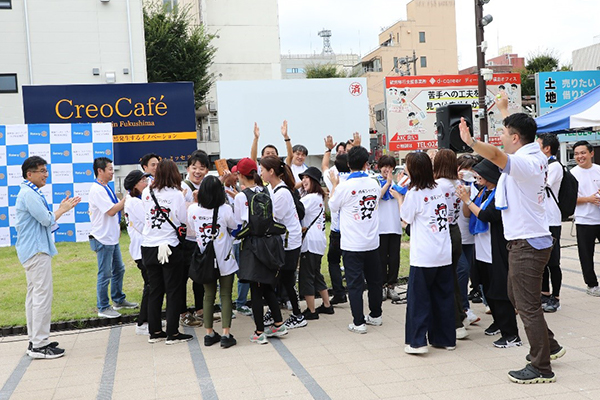
By Hiroyasu Goami, Rotary Club of Fukushima, Japan
In Japan, picking up trash is a sport. SpoGOMI, or Sport x Trash Pickup, began in Japan in 2008 and involves teams competing to pick up the most trash. Fukushima prefecture has the dubious distinction of being one of the worst in Japan for waste generation. We have been hosting a SpoGOMI tournament every year since 2021 to reduce waste and raise awareness about littering.
We held our fourth tournament in Fukushima on 28 September, with 93 teams and 410 participants. The organization that sets the rules for SpoGOMI (which approved our event) said we had the largest number of participants ever for such a tournament. We were very pleased, as it shows that people’s interest in trash collection is growing. We are accomplishing our goal of educating the community and helping protect our environment from this waste.
For our event, each team consisted of three to five people. Teams included members of Rotary, Rotaract, and Interact as well as family members, coworkers, classmates, and friends. One of the appeals of the game is that anyone, from small children to the elderly, can easily participate.
The rules state that members of a team must remain within 10 meters (32 feet) of each other and not run. Each team has 50 minutes to cover a 1.3-kilometer-size (.8 mile) area located around a city center. Points are awarded for the amount and type of trash. For example, cigarette butts are worth 100 points, plastic bottles 40 points, heavy bottles and cans 20 points, non-burnable glass and metal 5 points, and so on. The winner is the team that earns the most points, so a strategy is definitely necessary.
Although we were concerned that it might rain, it turned out to be a perfect day for picking up trash: cloudy and not too hot or cold. The competition started at 10 a.m. with a shout of “picking up trash is a sport.” One young participant even commented, “The trash looks like treasure.”
Once collected, the litter is separated into recyclables, burnables, and non-burnables, and then weighed to calculate the points. During the 40 minutes it took to weigh the garbage and calculate points, the local Fukushima Toryo High School dance club put on a passionate performance.
Team “CLEAN JAPANDA” was declared the winner, having picked up 9.3 kg (about 20 pounds) and earned 1,554.6 points. The team of five coworkers won by a landslide, beating the second-place team by nearly 500 points. The total amount of garbage collected by all teams was about 230 kg (about 500 pounds).
At an award ceremony, we gave out prizes to the top five teams, as well as teams that placed in round numbers (such as 70th and 80th place). Participants said they were surprised how much trash was picked up and expressed a desire to do it again next year.
Because the event is focused on the environment, special measures were taken to have as low an impact as possible. Fuel cell and electric vehicles were used, and the trophies were made from recycled wood produced in the prefecture.
The problem of plastic marine litter is becoming serious worldwide. It is feared that, by the year 2050, the volume of marine litter will exceed the number of fish. Seventy to eighty percent of marine litter comes from cities. When it rains, city litter washes into waterways, which then flow into the sea.
To keep nature beautiful for our children and grandchildren, we must become a recycling-oriented society that produces less waste and recycles instead of throwing everything away. Awareness is paramount. This initiative is a step in that direction. What’s more, it’s wonderful that we can take action while letting people know what Rotary is about. I would like to expand these efforts.
Why not try “SpoGOMl” in your area?
About the author: Hiroyasu Goami is a television broadcaster and currently serves as an advisor to Fukushima Chuo Television Co., Ltd. He joined the Fukushima Rotary Club in 2014 and served as the club president in 2020-21. He moved from Tokyo to Fukushima 10 years ago. He is drawing on his experience working for local newspapers and television to promote Fukushima’s appeal.
https://blog.rotary.org/2024/11/05/japanese-sport-turns-trash-pickup-into-a-competition/

